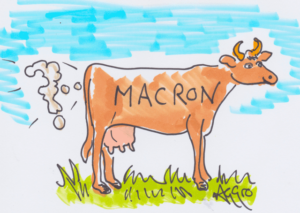27 July 2017
Made in France?
The Cornish flood
By Chin Chin
What caused it then? Rain poured down on the streets of Coverack in Cornwall on a scale not seen since Noah. Was this a direct punishment by the Almighty? Were there, among the rubble swept into the sea, the remnants of altars to Baal? Did a modern Elijah stand on the hills, staff outstretched, bringing down the furies of the Lord to discourage the evil practices of the Cornish?
 However overdue such an intervention may appear, it seems not. Apparently the divine scourging of the Cornish has been postponed to another day and last week’s floods had a far more mundane cause. Yes, you have guessed it, a build-up of hot air over France.
However overdue such an intervention may appear, it seems not. Apparently the divine scourging of the Cornish has been postponed to another day and last week’s floods had a far more mundane cause. Yes, you have guessed it, a build-up of hot air over France.
The generation of too much hot air across the channel has been a danger ever since the election of Mr Macron to the presidency. Calling his party “En Marche”, a name which shared his own initials, was the first sign. The passionate holding of President Trump’s hand reinforced the impression. This is a man who likes gesture politics, who burnishes his image and who can produce hot air until the cows come home. There is nothing wrong with that but the question is: is there enough behind it?
French leaders have always been rather grander than ours (compare the Louvre with our own Buckingham Palace) and generally they have had to be. France is a difficult country to reform because its institutions are powerfully embedded and supported by a population which is jealous of its privileges. That is both a good thing and a bad one. It puts a brake on populist politics, which may be needed in the 21st-century. On the other hand it makes it difficult to push through any changes which are needed. Sometimes that can be disastrous. For example a long series of monarchs tried to reform the tax system by removing the exemptions for the nobles and the clergy. They never managed it, leaving the burden with the middle and lower classes. The effect? The French Revolution. The successful defence by the unions of the Labour laws has held back economic progress since the war.
It takes a very powerful reformer to take on these interests, however grand their public image might be. Napoleon managed it, of course, combining an unmistakable taste for grandeur (Mr Macron’s use of initials is perhaps reminiscent of Napoleon use of the letter “N”) with considerable ruthlessness, and famously driving back popular protest with “a whiff of grapeshot”. If that is what is needed, and it may be, does Mr Macron have the stomach for it?
From this side of the Channel, it is extremely hard to tell. Certainly he has tapped into French dissatisfaction with the French system to create a new political force. That, though, is what demagogues do and you could say that Mr Farage had achieved much the same in the Britain. It is a long way, though, from successfully using that force as an engine of reform, and over the next few months we will discover whether he can do that or not. His first clash, with the military, bodes well. Although it led to the resignation of General Pierre de Villiers, the head of the armed forces, on the basis that the proposed cuts would not leave him with sufficient funds to guarantee France’s defences or support French ambitions, Mr Macron stood his ground. In the context of the forthcoming struggle with the unions that is probably more important than being right. Well done, Macron. Un point to the cause of reform: nil point to the French resistance to change. So far, so good!
And yet there is something which makes one uneasy about it all. Politicians who rise suddenly on the wave of public acclaim can fall suddenly too. Look at the astonishing rise and fall in the popularity of our own Prime Minister, or Boris Johnson come to that. It is often the ones who work away quietly in an unspectacular manner who achieve the most. Attlee, rather than Churchill, just after the war.
It is easy, with the current tensions over Brexit, to hope that things go wrong in France. After all, they are on the opposite side of a tough negotiation and will take little account of our interests. “A plague on all the houses”, you might say. If it all goes wrong there will be schadenfreude a plenty for us to enjoy. Yet that is too narrow a view. Failure by Mr Macron is likely to mean a triumph for Marine Le Pen next time around and a boost for the European nationalist right. Political movements like that have a way of spreading and, although our approach is different from the French, the Channel is just a thin piece of water. We have seen a major European economy turn to the far right before and it was not a happy experience. For the moment then we can only watch the hot air rise from France and hope that it is not the harbinger of something worse. Oh yes, and dig more flood drains in Cornwall.
If you enjoyed this article please share it using the buttons above.
Please click here if you would like a weekly email on publication of the ShawSheet

